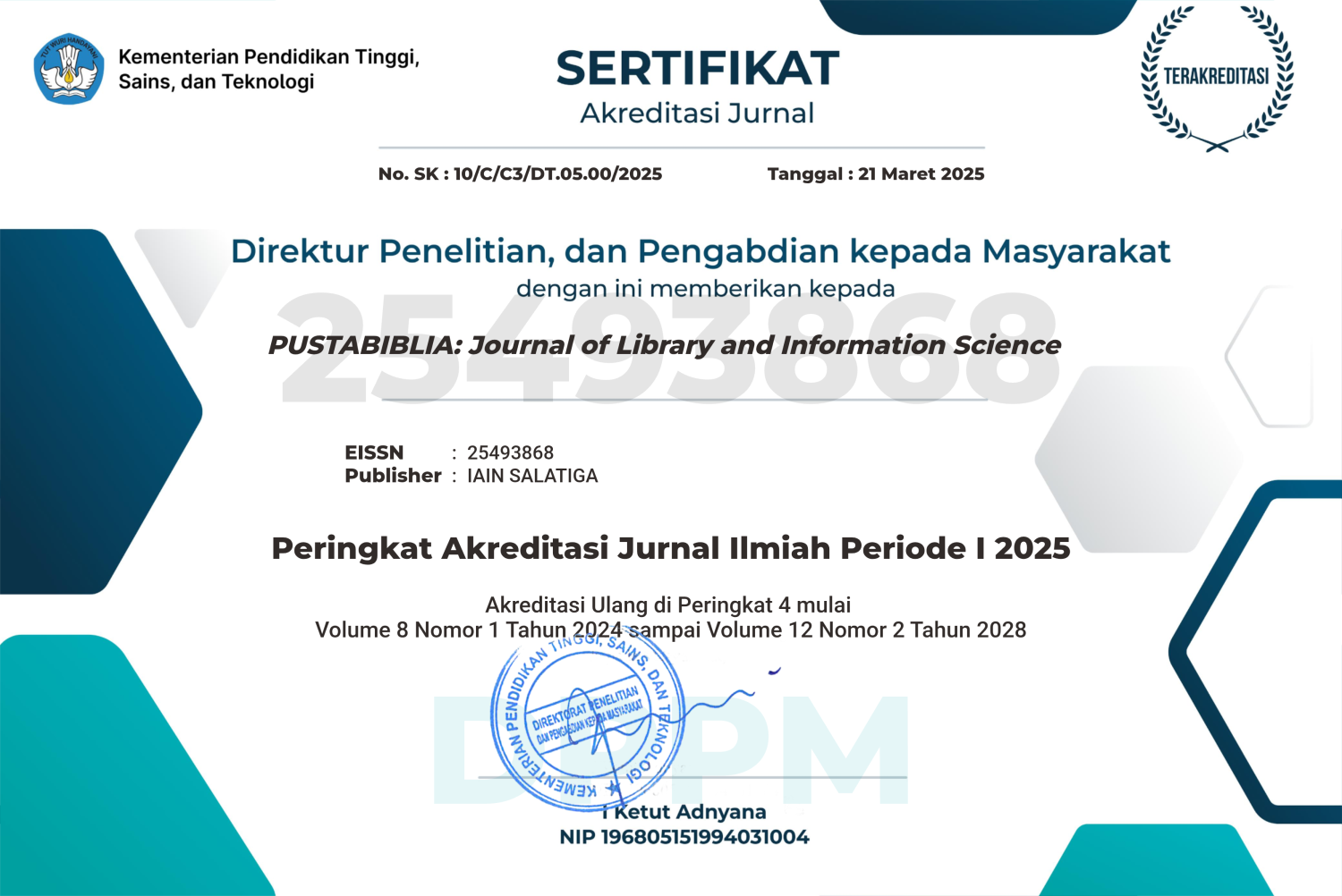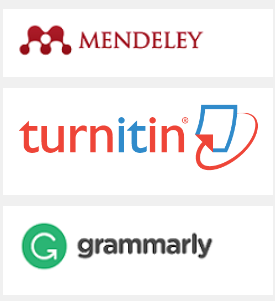Kecerdasan buatan dalam pengelolaan perpustakaan
DOI:
https://doi.org/10.18326/pustabiblia.v9i1.2150Keywords:
Artificial Intelligence, Library, Cataloging, Library managementAbstract
Libraries are information centers that must always keep up with the times. With the presence of increasingly sophisticated information technology, libraries can also perform cataloging and management automatically. This research aims to provide a deeper understanding of the utilization of artificial intelligence in assisting library management, knowing the positive and negative impacts of its use, as well as data security when using artificial intelligence systems. The research method used is a narrative literature review by analyzing several related journals. The results show that artificial intelligence has many benefits in improving library services, such as catalog automation, circulation, and reference services. However, there are also some risks that must be considered, such as the security of catalog data storage, the need for adequate electrical resources, and the possibility of disruptions to library services if there are problems with the system. This research concludes that the utilization of artificial intelligence in library management needs to be supported by thorough preparation, starting from technological infrastructure, the availability of skilled human resources, to data security policies. Librarians must also continue to develop their competencies in order to optimize the use of technology and provide better service to library users. Thus, libraries can continue to innovate and respond to challenges in the current era of information technology. Therefore, libraries must prepare a mature strategy in implementing artificial intelligence in order to minimize the risks that may occur.
References
American Library Association (ALA). 2020. "The Impact of Artificial Intelligence on Libraries." https://www.ala.org/.
Aydin, E., & Kose, U. 2021. "Applications of artificial intelligence in libraries: A review." Journal of Librarianship and Information Science 53 (4): 569-589
Chen, C., & Sun, Y. 2020. "Artificial intelligence in libraries: A review and analysis." Library and Information Science Research 42 (3): 100803.
Dewi, A. O. P. 2020. "Kecerdasan Buatan sebagai Konsep Baru pada Perpustakaan." Anuva: Jurnal Kajian Budaya, Perpustakaan, dan Informasi 4 (4): 453-460. https://ejournal2.undip.ac.id/index.php/anuva
Edwin Setiawan, Adi Pramana Putra, Muhammad Saesar Fajar Almunfasir, & R. Andhika Prabu. 2023. "Kecerdasan Buatan pada Perpustakaan Sebagai Wajah Baru Literasi: Kajian Pustaka." AI Dan SPK : Jurnal Artificial Intelligent Dan Sistem Penunjang Keputusan 1 (1): 92–99. http://jurnalmahasiswa.com/index.php/aidanspk
Li, Y., & Jiang, H. 2022. "Artificial intelligence in libraries: A comprehensive survey and future directions." Journal of Information Science 48 (3): 449-472.
Manongga, D., Rahardja, U., Sembiring, I., Lutfiani, N., & Yadila, A. B. 2022. "Dampak Kecerdasan Buatan Bagi Pendidikan." ADI Bisnis Digital Interdisiplin Jurnal 3 (2): 110-124.
Munthe, Abdul Rasyid. 2016. “Pengelolaan Perpustakaan dalam Meningkatkan Minat Belajar.” Jurnal Pustaka Ilmiah 6 (1): 21-30.
Rahayu, F. R., Gunawan, H., & Ripa’i, Y. 2023. "Pengelolaan Perpustakaan Sekolah dan Peningkatan Minat Baca Siswa di SMK N 1 Pangandaran." Jurnal Pelita Nusantara 1 (1): 33-38.
Sriatin, N. A. 2022. "Pemanfaatan Perpustakaan Sekolah Untuk Meningkatkan Minat Baca Siswa Di Sman 5 Taruna Brawijaya Jawa Timur." Jurnal Dinamika Pendidikan, Ekonomi, dan Bisnis 2 (2): 11–28.
Wardani, N. K., & Ilmi, B. 2021. "Penentuan Tajuk Entri Utama Pada Proses Katalogisasi Bahan Pustaka: Permasalahan dan Tantangan." Jurnal Pustaka Ilmiah 7 (2): 87-96.
Suwahyono, Nurasih dkk. 2004. Pedoman Penampilan Majalah Ilmiah Indonesia. Jakarta: Pusat Dokumentasi dan Informasi Ilmiah, LIPI.
Widiarti. 2016. Diversitas Genetik Anopheles Balabacensis, Baisas di Berbagai Daerah Indonesia Berdasarkan Sekuen Gen ITS 2 DNA Ribosom. Buletin Penelitian Kesehatan, Vol.44, No.1: 1-12.
Downloads
Published
Issue
Section
License
Copyright (c) 2025 Syaira Aulia Adhana, Rully Khairul Anwar, Siti Chaerani Djen Amar, Evi Nursanti Rukmana

This work is licensed under a Creative Commons Attribution-ShareAlike 4.0 International License.
Copyright
Authors retain copyright and grant the journal right of first publication with the work simultaneously licensed under a Creative Commons Attribution-ShareAlike 4.0 International License. In line with the license, authors are allowed to share and adapt the material. In addition, the material must be given appropriate credit, provided with a link to the license, and indicated if changes were made. If authors remix, transform or build upon the material, authors must distribute their contributions under the same license as the original.
Licensing

This work is licensed under a Creative Commons Attribution-ShareAlike 4.0 International License.







